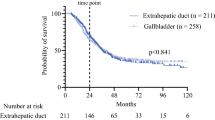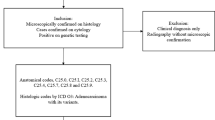Abstract
Purpose
Research has shown that racial/ethnic disparities exist in outcomes for colorectal cancer (CRC) patients, but there are no studies assessing inpatient palliative care utilization and hospitalization outcomes in this population. We examined racial/ethnic disparities in palliative care utilization and hospitalization outcomes among CRC and early-onset CRC patients.
Methods
Using National Inpatient Sample (NIS) data collected between 2016 and 2018, cross-sectional analyses were performed. Descriptive analyses were done, stratified by race/ethnicity. Multivariable logistic and linear regression models were used to examine racial/ethnic differences in palliative care utilization, inpatient mortality, chemotherapy/radiotherapy use, length of stay and total hospital charges among hospitalized patients with CRC and early-onset CRC.
Results
Blacks had higher odds (AOR: 1.09; 95% CI: 1.03–1.16) of receiving palliative care consultation while Hispanics had lower odds (AOR: 0.90; 95% CI: 0.84–0.96) compared to Whites. Blacks had 1.1 times higher odds (95% CI: 1.01–1.18) of inpatient mortality relative to Whites while Hispanics had 16% (AOR: 0.84; 95% CI: 0.76–0.93) lower odds of inpatient mortality. Compared to Whites, Blacks (AOR: 1.99; 95% CI: 1.64–2.41), Hispanics (AOR: 2.49; 95% CI: 1.94–3.19) and colorectal cancer patients in the other category (AOR: 1.72; 95% CI: 1.35–2.18) were more likely to receive inpatient treatment with chemotherapy/radiotherapy. Furthermore, Black patients were 1.1 times (95% CI: 1.06–1.14) more likely to have a length of stay more than 5 days. Blacks (𝛃: $3,096.7; 95% CI: $1,207.0–$4,986.5) Hispanic (𝛃: $10,237.5; 95% CI: $7,558.2–$12,916.8) and other patients (𝛃: $6,332.0; 95% CI: $2,830.9–$9, 833.2) had higher hospital charges relative to their White counterparts. Among patients with early onset CRC, Blacks had higher palliative care use (AOR: 1.29; 95% CI: 1.10–1.51) and inpatient mortality (AOR: 1.38; 95% CI: 1.06–1.79) while Hispanics reported $5,589.7 (95% CI: $683.2–$10,496.2) higher total hospital charges and were more likely to receive inpatient chemotherapy/radiotherapy (AOR: 2.48; 95% CI: 1.70–3.63).
Conclusion
Further research is needed to explore specific cultural, socioeconomic, and political factors that explain these disparities and identify ways to narrow the gap. Meanwhile, the healthcare sector will need to assess what strategies might be helpful in addressing these disparities in outcomes in the context of other socioeconomic and cultural factors that may be affecting the patients.
Similar content being viewed by others
Data availability
Data to support the findings of this research are publicly available on the Agency for Healthcare Research and Quality website at https://www.hcup-us.ahrq.gov/db/nation/nis/nisdbdocumentation.jsp.
References
(2022) American Cancer Society. Key Statistics for Colorectal Cancer
Stoffel EM, Murphy CC (2020) Epidemiology and mechanisms of the increasing incidence of Colon and rectal cancers in young adults. Gastroenterology 158:341–353
Mojtahedi Z, Koo JS, Yoo J et al (2021) Palliative Care and Life-Sustaining/Local procedures in Colorectal Cancer in the United States hospitals: a ten-year perspective. Cancer Manag Res 13:7569–7577
Radbruch L, De Lima L, Knaul F et al (2020) Redefining palliative care—A new consensus-based definition. Journal of pain and symptom management. 60: 754 – 64
Jackson CS, Oman M, Patel AM, Vega KJ (2016) Health disparities in Colorectal cancer among racial and ethnic minorities in the United States. J Gastrointest Oncol 7:S32–S43
Fuchs CS, Giovannucci EL, Colditz GA, Hunter DJ, Speizer FE, Willett WC (1994) A prospective study of family history and the risk of Colorectal cancer. N Engl J Med 331:1669–1674
McMahon LF Jr, Wolfe RA, Huang S, Tedeschi P, Manning W Jr, Edlund MJ (1999) Racial and gender variation in use of diagnostic colonic procedures in the Michigan Medicare population. Med Care. 712–717
James TM, Greiner K, Ellerbeck EF, Feng C, Ahluwalia JS (2006) Disparities in Colorectal cancer screening: a guideline-based analysis of adherence. Ethn Dis 16:228–233
Dominitz JA, Samsa GP, Landsman P, Provenzale D (1998) Race, treatment, and survival among colorectal carcinoma patients in an equal-access medical system. Cancer: Interdisciplinary International Journal of the American Cancer Society 82:2312–2320
Dignam JJ, Colangelo L, Tian W et al (1999) Outcomes among african-americans and caucasians in colon Cancer adjuvant therapy trials: findings from the National Surgical adjuvant breast and Bowel Project. J Natl Cancer Inst 91:1933–1940
Williams R, White P, Nieto J, Vieira D, Francois F, Hamilton F (2016) Colorectal Cancer in African americans: an update. Clin Transl Gastroenterol 7:e185–e
Alexander DD, Waterbor J, Hughes T, Funkhouser E, Grizzle W, Manne U (2007) African-American and caucasian disparities in Colorectal cancer mortality and survival by data source: an epidemiologic review. Cancer Biomarkers 3:301–313
Augustus GJ, Ellis NA (2018) Colorectal Cancer disparity in African americans: risk factors and carcinogenic mechanisms. Am J Pathol 188:291–303
Toh HJ, Lim ZY, Yap P, Tang T (2017) Factors associated with prolonged length of stay in older patients. Singap Med J 58:134–138
Tramontano AC, Chen Y, Watson TR, Eckel A, Hur C, Kong CY (2020) Racial/ethnic disparities in Colorectal cancer treatment utilization and phase-specific costs, 2000–2014. PLoS ONE 15:e0231599–e
Griggs JJ (2020) Disparities in Palliative Care in patients with Cancer. J Clin Oncol 38:974–979
Sharma RK, Cameron KA, Chmiel JS et al (2015) Racial/Ethnic differences in Inpatient Palliative Care Consultation for patients with Advanced Cancer. J Clin Oncol 33:3802–3808
Muni S, Engelberg RA, Treece PD, Dotolo D, Curtis JR (2011) The influence of race/ethnicity and socioeconomic status on end-of-life care in the ICU. Chest 139:1025–1033
Wicher CP, Meeker MA (2012) What influences African American end-of-life preferences? J Health Care Poor Underserved 23:28–58
Barnato AE, Anthony DL, Skinner J, Gallagher PM, Fisher ES (2009) Racial and ethnic differences in preferences for end-of-life treatment. J Gen Intern Med 24:695–701
Degenholtz HB, Thomas SB, Miller MJ (2003) Race and the intensive care unit: disparities and preferences for end-of-life care. Crit Care Med 31:S373–S8
Blackhall LJ, Frank G, Murphy ST, Michel V, Palmer JM, Azen SP (1999) Ethnicity and attitudes towards life sustaining technology. Social science & medicine. 48: 1779-89
Rizzuto J, Aldridge MD (2018) Racial disparities in Hospice outcomes: a race or hospice-level effect? J Am Geriatr Soc 66:407–413
Ornstein KA, Roth DL, Huang J et al (2020) Evaluation of racial disparities in Hospice Use and End-of-life treatment intensity in the REGARDS Cohort. JAMA Netw Open 3:e2014639–e
Islam JY, Deveaux A, Previs RA, Akinyemiju T (2020) Racial disparities in palliative care utilization among metastatic gynecological cancer patients living at last follow-up: an analysis of the National Cancer Data Base. Data Brief 34:106705
Ward E, Jemal A, Cokkinides V et al (2004) Cancer disparities by race/ethnicity and socioeconomic status. Cancer J Clin 54:78–93
Grubbs SS, Polite BN, Carney J Jr et al (2013) Eliminating racial disparities in colorectal cancer in the real world: it took a village. Journal of Clinical Oncology. 31: 1928
Aizer AA, Wilhite TJ, Chen MH et al (2014) Lack of reduction in racial disparities in cancer-specific mortality over a 20‐year period. Cancer 120:1532–1539
Barzi A, Yang D, Mostofizadeh S, Lenz H-J (2017) Trends in Colorectal cancer mortality in hispanics: a SEER analysis. Oncotarget 8:108771–108777
Grubbs SS, Polite BN, Carney J Jr. et al (2013) Eliminating racial disparities in Colorectal cancer in the real world: it took a village. J Clin Oncology: Official J Am Soc Clin Oncol 31:1928–1930
West H, Jin JO (2015) Performance status in patients with Cancer. JAMA Oncol 1:998
Dumas L, Bowen R, Butler J, Banerjee S (2021) Under-treatment of older patients with newly diagnosed epithelial Ovarian Cancer remains an issue. Cancers (Basel) 13:952
Yan G, Norris KC, Greene T et al (2014) Race/ethnicity, age, and risk of hospital admission and length of stay during the first year of maintenance hemodialysis. Clin J Am Soc Nephrol 9:1402–1409
Akinyemiju TF, Naik G, Ogunsina K, Dibaba DT, Vin-Raviv N (2018) Demographic, presentation, and treatment factors and racial disparities in Ovarian cancer hospitalization outcomes. Cancer Causes Control 29:333–342
Davidson T, Mirza F, Baig MM (2021) Impact of socio-economic status and race on emergency hospital admission outcomes: analysis from hospital admissions between 2001 and 2012. Health Serv Manage Res. 9514848211012189
Akinyemiju T, Meng Q, Vin-Raviv N (2016) Race/ethnicity and socio-economic differences in Colorectal cancer Surgery outcomes: analysis of the nationwide inpatient sample. BMC Cancer 16:715
Sarfati D, Koczwara B, Jackson C (2016) The impact of comorbidity on cancer and its treatment. CA: a cancer journal for clinicians. 66: 337 – 50
Cheng E, Blackburn HN, Ng K et al (2021) Analysis of Survival among adults with early-onset Colorectal Cancer in the National Cancer Database. JAMA Netw Open 4:e2112539–e
Holowatyj AN, Ruterbusch JJ, Rozek LS, Cote ML, Stoffel EM (2016) Racial/Ethnic disparities in Survival among patients with Young-Onset Colorectal Cancer. J Clin Oncol 34:2148–2156
Chang DT, Pai RK, Rybicki LA et al (2012) Clinicopathologic and molecular features of sporadic early-onset colorectal adenocarcinoma: an adenocarcinoma with frequent signet ring cell differentiation, rectal and sigmoid involvement, and adverse morphologic features. Mod Pathol 25:1128–1139
Bleyer A, Barr R, Hayes-Lattin B, Thomas D, Ellis C, Anderson B (2008) The distinctive biology of cancer in adolescents and young adults. Nat Rev Cancer 8:288–298
Funding
No funds, grants, or other support was received.
Author information
Authors and Affiliations
Corresponding author
Ethics declarations
Ethical approval
Not required. Data used for the study is de-identified and publicly available, hence, does not require institutional review board (IRB) review since it does not meet the code of federal regulations definition of human subjects research.
Competing interests
The authors have no relevant financial or non-financial interests to disclose.
Additional information
Publisher’s Note
Springer Nature remains neutral with regard to jurisdictional claims in published maps and institutional affiliations.
Rights and permissions
Springer Nature or its licensor (e.g. a society or other partner) holds exclusive rights to this article under a publishing agreement with the author(s) or other rightsholder(s); author self-archiving of the accepted manuscript version of this article is solely governed by the terms of such publishing agreement and applicable law.
About this article
Cite this article
Jackson, I., Bley, E. Racial/ethnic disparities in inpatient palliative care utilization and hospitalization outcomes among patients with colorectal cancer. Cancer Causes Control 35, 711–717 (2024). https://doi.org/10.1007/s10552-023-01844-2
Received:
Accepted:
Published:
Issue Date:
DOI: https://doi.org/10.1007/s10552-023-01844-2




